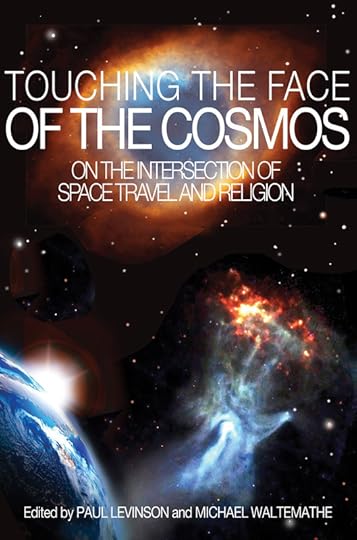Paul Levinson's Blog: Levinson at Large, page 98
May 6, 2021
Stowaway: Breathless Realism

I caught Stowaway last night, up on Netflix since the end of April. I liked it a lot, even though I don't like unhappy endings in space travel dramas, however realistic they may be. I'll get to that in moment.
The MTS-42 mission to Mars, with a small crew of captain Marina Barnett, botanist David Kim, and medical researcher Zoe Levenson is a good set-up. Although mission control sees a little more weight than expected on lift off, they confirm that there's enough fuel to successfully make the voyage. Given the title and publicity for the movie, we the audience of course know that this weight comes from Michael Adams, a technician who was knocked unconscious in a pre-launch accident that also landed him behind a panel. He wants to get back to Earth to take care of his little sister, but the ship can't do that. This is also good continuing set-up. And the narrative then pitches into full-fledged adrenalin when it's discovered that the accident that knocked out Michael also took out the CO2 scrubber. The upshot: although there are emergency lithium canisters that can take care of some of the carbon dioxide problem, the best they can do is provide breathable air for two people.
What to do? David has algae that can produce oxygen, intended for use on Mars. Can he re-purpose the algae for use on the ship? Well ... yes and no, and here is where the stark realism of science and life in space rears its head. Suffice to say the algae is unreliable and it's soon clear that the most it can do is provide sufficient oxygen for one more person. The movie's at its psychological best at this point, as Marina, David, and Zoe discuss and agonize what to do.
There is another option -- an EVA trip to retrieve liquid oxygen from the launch section of MTS-42 -- but it's dangerous and only David and Zoe can do it (the captain's arm is in a cast, and Michael doesn't have the training). Meanwhile, David's algae is totally dying and a solar storm with lethal radiation is headed towards the MTS-42. I'll leave it to you to see the breathless action that ensues.
But I will say that I regretted the very ending, and not just because Zoe Levenson has almost the same last name as I do. Her sacrifice is realistic, true, and the reactions of her crewmates were powerful cinema, but I would have much preferred she or her crewmates figuring out a way to weather the solar storm. Why couldn't she have stayed in the launch vehicle until the storm cleared? The captain said the storm could take hours to pass through, but staying in the launch vehicle and whether that could have given Zoe sufficient protection wasn't even raised as an option.
But do see this movie, if you're a space enthusiast, and want to see human beings at their best. Good work by Joe Penna who wrote and directed, Ryan Morrison who wrote, and fine acting by Anna Kendrick as Zoe, Daniel Dae Kim as David, Toni Collette as the captain, and Shamier Anderson as the stowaway Michael.
See also The Missing Orientation
Paul Levinson's books ... Paul Levinson's musicStowaway: Breathless Realism in Space Travel

I caught Stowaway last night, up on Netflix since the end of April. I liked it a lot, even though I don't like unhappy endings in space travel dramas, however realistic they may be. I'll get to that in moment.
The MTS-42 mission to Mars, with a small crew of captain Marina Barnett, botanist David Kim, and medical researcher Zoe Levenson is a good set-up. Although mission control sees a little more weight than expected on lift off, they confirm that there's enough fuel to successfully make the voyage. Given the title and publicity for the movie, we the audience of course know that this weight comes from Michael Adams, a technician who was knocked unconscious in a pre-launch accident that also landed him behind a panel. He wants to get back to Earth to take care of his little sister, but the ship can't do that. This is also good continuing set-up. And the narrative then pitches into full-fledged adrenalin when it's discovered that the accident that knocked out Michael also took out the CO2 scrubber. The upshot: although there are emergency lithium canisters that can take care of some of the carbon dioxide problem, the best they can do is provide breathable air for two people.
What to do? David has algae that can produce oxygen, intended for use on Mars. Can he re-purpose the algae for use on the ship? Well ... yes and no, and here is where the stark realism of science and life in space rears its head. Suffice to say the algae is unreliable and it's soon clear that the most it can do is provide sufficient oxygen for one more person. The movie's at its psychological best at this point, as Marina, David, and Zoe discuss and agonize what to do.
There is another option -- an EVA trip to retrieve liquid oxygen from the launch section of MTS-42 -- but it's dangerous and only David and Zoe can do it (the captain's arm is in a cast, and Michael doesn't have the training). Meanwhile, David's algae is totally dying and a solar storm with lethal radiation is headed towards the MTS-42. I'll leave it to you to see the breathless action that ensues.
But I will say that I regretted the very ending, and not just because Zoe Levenson has almost the same last name as I do. Her sacrifice is realistic, true, and the reactions of her crewmates were powerful cinema, but I would have much preferred she or her crewmates figuring out a way to weather the solar storm. Why couldn't she have stayed in the launch vehicle until the storm cleared? The captain said the storm could take hours to pass through, but staying in the launch vehicle and whether that could have given Zoe sufficient protection wasn't even raised as an option.
But do see this movie, if you're a space enthusiast, and want to see human beings at their best. Good work by Joe Penna who wrote and directed, Ryan Morrison who wrote, and fine acting by Anna Kendrick as Zoe, Daniel Dae Kim as David, Toni Collette as the captain, and Shamier Anderson as the stowaway Michael.
See also The Missing Orientation
Paul Levinson's books ... Paul Levinson's musicMay 4, 2021
The Girlfriend Experience 3.1-2: Intertwining Desires

Well, The Girlfriend Experience is back on Starz for a third season, and of course I had to watch it. Not for the reasons you think. Well, maybe it is for those reasons, though I don't know you, and you don't me, so guessing at reasons is always a risk. Ok, I liked the first two seasons for two reasons, the obvious one, and I also liked the stories.
But let me start by saying I liked the first season a lot more than the second season, whatever I may have said at the time I saw them (see links to my reviews at the end of this review). I thought the first season was a strong, more unified story than either of the two parallel stories in the second second. And, so far, I'm liking the third season as much as the first season.
There are some obvious, cliched parts, though. I've seen narratives on television devoted towards perfecting a dating app at least twice in the past year, and have even been quoted as saying these kinds of coincidences are not coincidences in the usual sense of the word, but are either an expression of Hegel's spirit of age or a result of industrial espionage in the movie/television business. So Iris leaving a PhD program in the U. S. to work at a company devoted to discovering and encoding why people are attracted to one another is fun enough to see, but so far not all that original.
The other part of Iris's life, though, joining "V" to give men "the girlfriend" experience, is more original and assisted by Iris played by The Affair's Julia Goldani Telles who looks and acts just fine. Telles in the first episodes projects a complex persona comprised in almost equal measure of vulnerability and confidence. The fact that, in this story, Iris's day and night jobs both draw on the same body of knowledge (apologies for the pun) works very well. In both jobs, Iris needs to discover what men like and want, and parlay that into different kinds but related dividends.
It will be good to see where these stories go, and I'll be back here with reviews.
See also The Girlfriend Experience 2.1-2: Two for One ... The Girlfriend Experience 2.3-4: Hard to Come By ... The Girlfriend Experience 2.5-6: In and Out ... The Girlfriend Experience 2.7-8: Sundry Seductions ... The Girlfriend Experience 2.9-10: The End of Illusions ... The Girlfriend Experience 2.11-12; One and One Is Less than One
And see also The Girlfriend Experience: Eminently Worth It (my review of Season 1)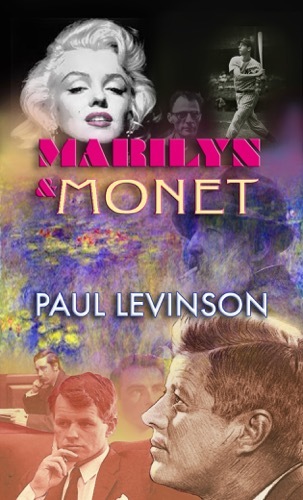
It all started in the hot summer of 1960, when Marilyn Monroe walked off the set of The Misfits and began to hear a haunting song in her head, "Goodbye Norma Jean" ...
May 3, 2021
The Nevers 1.4: Who Needs to be Found?

I'll hazard a guess and say it's Maladie. There's goodness buried inside her depravity or darkness, and that's what Mary was singing out about needing to be found. But that raises another crucial question.
Are the "Turns" inherently good, unless something happens to their possessors to turn the Turns into vehicles of evil? This notion of superpower, which is basically good, unless and until perverted, is fundamental to science fantasy. In effect, the Force in Star Wars, which is futuristic outer space science fantasy, is an example of a single Turn used in multiple ways that span good to evil.
And, actually, the deepest most incorrigible evils in The Nevers seem to reside in the Turnless, soulless humans who want to stamp out those who have Turns. Indeed, the only really good Turnless human I can think of is Mundi, and I'm suspecting he may have some kind of hidden Turn, too, that perhaps he is unaware of. Ok, I guess Hugo is good and Turnless, too, but so far he's been a largely inconsequential character, whose main job is (non-magical) charm and comic relief.
To get back to the initial question, the other possible person Mary that could have singing of, waiting to be found in the darkness, could be someone who is blind. I can't think of any major character off-hand who fits that bill, but Maladie did leave a message, "Look not to Heaven Lest You blind God."
See also The Nevers 1.1: Never Say Never ... The Nevers 1.2: Song and Gun ... The Nevers 1.3: Mary's Melody
"challenging fun" -- Entertainment Weekly
May 2, 2021
The Mosquito Coast 1.1-2: Edgy, Attractive, Enlightened, and Important
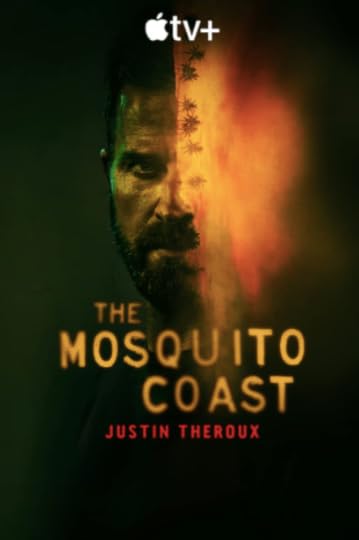
I caught the first two episodes of The Mosquito Coast, up on Apple TV+ on Friday, April 30. In a word: superb!
I suppose its closest streaming cousin these days is Ozark on Netflix. Both series deal with a family on the lam in the boondocks from a big city and some kind of life of crime. But The Mosquito Coast -- adapted from the Paul Theroux 1981 novel of the same name, made into a movie in 1986 starring Harrison Ford -- has a life and an energy and a point of view all its own. And it's attractive and even enlightened and important.
Allie Fox is not just a criminal, or maybe not even a criminal at all, except when he has to be. He has a philosophy, which condemns Democrats as well as Republicans, as well as industrial waste, poverty, and anti-vaxxers. He also invents kludgy but workable contraptions, and can talk fast enough to get himself and his family out of most but not all jams.
Allie is played very effectively by Justin Theroux (Paul's nephew!), who serves up just the right mix of righteous intensity and twinkle-in-his-eye zest for life and creative, off-beat ideas. Melissa George who is always a pleasure to see on the screen, plays Justin's wife Margot, and she also brings to this role a good mix of motherly love, quick thinking, and joie de vivre. And the two teenage kids -- Logan Polish as Dina and Gabriel Bateman as Charlie -- put in really powerful performances.
The second episode in particular offers a compelling narrative of immigrants and life on the southern border, and couldn't be more pertinent to today's headlines. The whole series has an edge and a timeliness, and I'll be watching and reviewing the remaining five episodes.
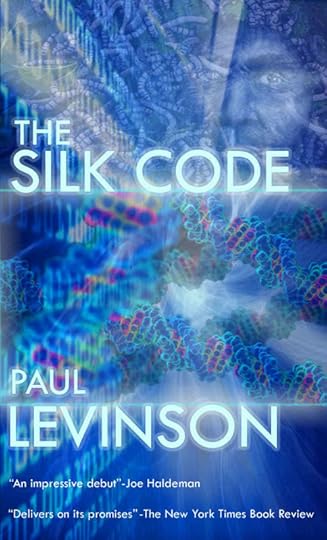
May 1, 2021
Podcast: Tenet: A Re-View
Welcome to Light On Light Through, Episode 174, in which I review, re-view, re-vu Tenet.
Paul Levinson's books ... Paul Levinson's music
Tenet: A Re-View
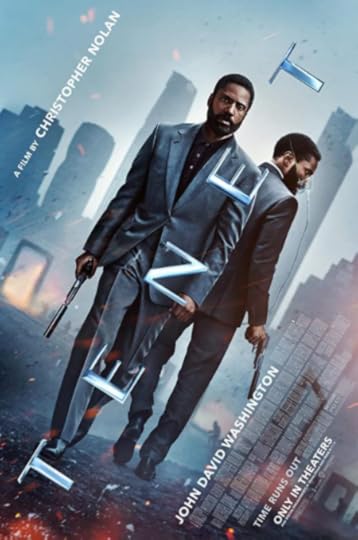
Well, I -- at last -- just saw Christopher Nolan's Tenet (on HBO). It was an excellent, sometimes seminal, time travel movie -- in particular, time reversal -- but not without its flaws.
Let's start with two of those:
1. Although the movie starts off with a good action scene, there's no time reversal I can see until about 50 minutes in, when the Protagonist has a battle with at least one guy moving in reverse time. We later learn that the Protagonist was actually fighting with two guys, one traveling in normal, forward time, the other in reverse time. This is a "time-pincer" mode of combat, which is one of the hallmarks of the narrative. All of that is very good stuff, but it took too long (50 mins) to first happen. We also learn that Protagonist's two combatants are later versions of himself. Also a nice touch. And we see the same scene from the other side at about 1 hour and 50 minutes into the movie -- also fun to see. But my first point, that this excellent sequence took too long to commence, still holds.
2. The grandfather paradox is explained too curtly, as, if you travel to the past and kill your grandfather, how did you exist to travel into the past in the first place? This leaves out the essential element of: you had to kill your grandfather before he impregnated your grandmother (who then would give birth to one of your parents), otherwise there would be no paradox. Yeah, I'm a stickler for getting it right in discussing paradoxes, they're mind bending enough when properly stated.
But there were lots of thoroughly excellent parts of the movie. I really like that the people in the future don't worry too much about accidentally annihilating themselves by messing around in the past. After all, they exist, so they couldn't have done too much damage to their future. This could have been a little more clear in the movie, but kudos to Tenet for at least expressing that inherently optimistic sentiment.
The backwards in time action and cinematography were outstanding, especially the cadre-level pincer movements, one going forward, the other going backward, in time, which reminded me in its own brief way of a battle scene out of Lord of the Rings. From about 1 hour and 24 minutes into the movie and onwards, it's pure cinematic gold, with twists and turns and quickly delivered metaphysical puzzlers at every turn.
Ok, I'm going to conclude this now, and record a podcast, which should be up in an hour or less. Look for it below. I may or may not say something more than what I wrote above.

some talk of cleaning up "loose ends" in Tenet
Paul Levinson's books ... Paul Levinson's musicApril 29, 2021
Podcast: Biden and the Republicans
Welcome to Light On Light Through, Episode 173, in which "Captain" Phil Merkel interviews me about Joe Biden's speech to Congress last night, and how likely it is that Republicans in Congress will enact Biden's proposals into laws. We also discuss the police killing of innocent African-Americans and other current events, including Michael Collins' (RIP) contribution to getting humans out into space. MaryBeth Rikouski joins us in the discussion.
Paul Levinson's books ... Paul Levinson's music
April 27, 2021
Big Sky 1.13: Ronald Back in Action

Well, it took lucky episode #1.13 of Big Sky tonight to see Ronald -- whom I now think of as demented John Denver -- back to his old tricks. In plain English, killing someone, with all the trimmings.
The victim was Mary, sister of Ronald's girlfriend Scarlett. So it's close to Ronald killing his sister-in-law to be, which is what might happen if Ronald were really the good boy he's always telling the mother he murdered and keeps inside his head he really is. (How's that for a tortured sentence). But speaking of which, he certainly verbally tortures Mary before he kills her with his patented insane commentary.
The killing is also notable because Cassie and Lindor pull up right after Ronald has done the deed. Somehow, he manages to escape. How does he do that? If Ronald is nothing else, he's one resourceful psycho. And he apparently has not only escaped, but took Mary's body, or hid it somewhere. If that's in the house, Cassie and Lindor don't find it.
What they do find, though, is another body. Whose? It's been there a while, so it's very likely Ronald didn't do that killing. (I say "very likely" because we still don't know exactly when Ronald and Scarlett first met.) But if not Ronald, who? At this point, likely either Mary or Scarlett.
So this was a very good episode. A new killing from Ronald, and a dead body Ronald apparently wasn't responsible for. Which means, a killer revived, and a likely new killer's work revealed. And just for good measure, things are getting even more abrasive in that abrasively dysfunctional Kleinsasser family.
And I'll be back here with a report next week in how at least a little of that turns out.
See also Big Sky 1.1: A Pretty Big Deal ... Big Sky 1.2: The "Goods" and the Ruined Plan ... Big Sky 1.3: "You Kidnapped the Wrong Girl" ... Big Sky 1.4: Controls on Psychos ... Big Sky 1.5: Winter Finale Indeed! ... Big Sky 1.6: "Sweet Psycho" ... Big Sky 1.7: The Montana State Trooper ... Big Sky 1.9: Crafty Ronald ... Big Sky 1.10-11: Rocky Mountain High, Somewhat Twisted ... Big Sky 1.12: Sheriff Before Butterscotch

Truth Be Told: An Excellent Telling
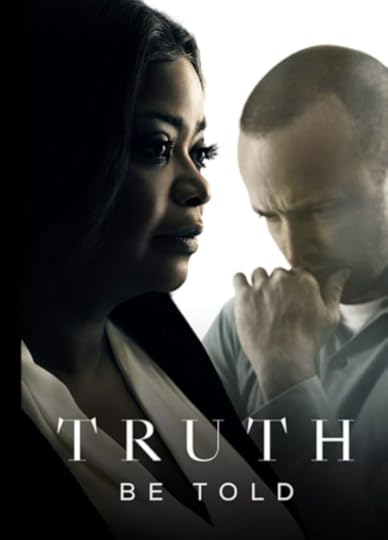
I saw Truth Be Told on Apple TV+ over the past few nights. It received a lukewarm response from critics but was much enjoyed by the general public. I'm with the general public on this one, not the myopic critics, what else is new. I'm really glad it was renewed for a second season, which should be up sometime this year.
The eight-episode mini-series rings a bell on a bunch of levels:
It's a first-class whodunnit, with at least a handful of plausible suspects, and a resolution which is both surprising, yet makes good sense in retrospect, or just want you want in this kind of murder mystery.Poppy is a reporter now podcaster, who revisits in her podcast a murder she reported on in The New York Times twenty years ago. Truth Be Told offers a compelling tableau of the relationship of traditional and newer media, in particular the pressures that a podcaster faces. This series is not the first to have a podcaster at the center of the narrative, but it's one of the best.Poppy is African-American, and Truth Be Told provides a well-furnished view of Black culture in America, ranging from family life to life in prison.The acting is really good. Octavia Spencer is just right as Poppy, combining head and heart, and struggling to keep her marriage sound as she devotes increasing time to finding the killer. Aaron Paul is great as the guy behind bars, whom Poppy is trying to exonerate and free -- I'd say this is his best performance since Breaking Bad (yeah, he was more effective in Truth Be Told than in Westworld). Lizzy Caplan is impressive as the Buhrman twins, convincingly portraying two different yet intersecting personalities. And the other characters were well played. Always good to see Mekhi Phifer (former detective helping Poppy) and Michael Beach (Poppy' husband) on the screen.If I had to cite one problem with the narrative, it would be Poppy's tendency to immediately go to the next most-likely suspect, each time a suspect is eliminated. I think Poppy is subtler and more intelligent than that. But this is a relatively small quibble. The series is based on a novel (Are You Sleeping by Karen Barber) which I haven't read, so I don't know where this problem originated, or who is responsible for all the sharp turns of events in the series which will keep you up late into the night. Hats off to Nichelle D. Tramble, creator of this series.And I'll see you back here later this year, with a review of the second season.
Paul Levinson's books ... Paul Levinson's music
Levinson at Large
- Paul Levinson's profile
- 340 followers


